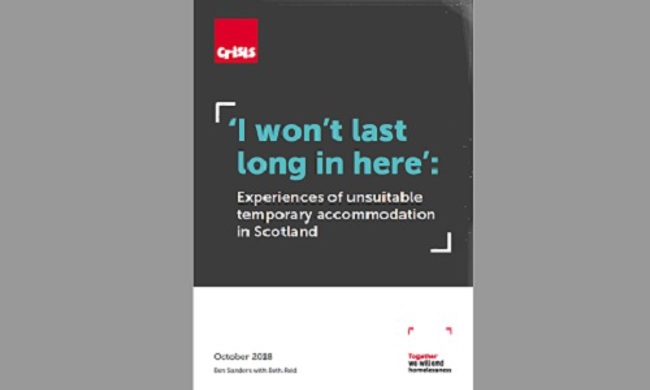Depressed, isolated and hungry – that’s the impact living in B&Bs can have on homeless people in Scotland according to new research from Crisis
22.10.2018
The Scottish Government must act quickly to move homeless people on from unsuitable temporary accommodation (UTA) as new research shows the detrimental impact it can have on lives.
The report, ‘I won’t last long in here – experiences of unsuitable temporary accommodation in Scotland’ published today, by homelessness charity Crisis, includes the experience of 74 people stuck living in B&Bs, hotels or unsupported hostels. The people interviewed were based in the six council areas with the worst record of long-term UTA placements - Aberdeenshire, Edinburgh, East Lothian, Glasgow, Highland and Midlothian. The shocking results include:
- 60% of people were subject to a curfew
- 3 in 4 said they were not allowed visits from family or friends
- 84% of respondents said they felt isolated by their living situation
- 45% of people said they had no access to a kitchen with over half of this number saying this meant they regularly skip a meal.
- 1/3 of people also had no fridge access.
Not surprisingly these restrictions on everyday life have a devastating impact on people’s state of mind with 88% of respondents experiencing depression because of their living conditions. Six out of ten people also reported a negative impact on their drug or alcohol use and 90% said they were uncertain about their future because of their situation.
Crisis is calling on the Scottish Government to change the law in this parliamentary year so that there is a seven-day time limit on the use of UTA for all homeless people. Currently, there is a legal restriction of seven days for families and pregnant women, but no limit at all for anyone else experiencing homelessness. The Scottish Government have accepted in principle (*see notes below) that this law should be extended to all homeless people but have given no indication on when this will happen.
Jon Sparkes, Chief Executive of Crisis, said: “Access to housing is a human right, yet this report shows that homeless people are being let down across Scotland, trapped in inhumane conditions for far too long. Lengthy stays in B&Bs, unsupported hostels or hotels are destructive, demoralising and stop people moving on with their lives.
“Scotland has often been a world-leader in tackling homelessness, including ending priority need in 2012. However, an unintended consequence of this has been an increase in the use of unsuitable forms of temporary accommodation. We know councils are working on rapid re-housing plans that will enable homeless people to be housed faster, but there must be a legal backstop which will restrict the use of unsuitable temporary housing to just seven days for everyone. This would prevent the current situation from ever happening again.”
Fewer people are leaving UTA than in previous years - last year 4,730 households entered B&B but only around half left, meaning more people are being trapped in inappropriate living conditions.
There are alternatives to UTA that would save councils money. Research commissioned by Crisis, earlier this year, shows that councils could save £29 million in 2018 alone by immediately moving people into more appropriate forms of temporary accommodation, such as supported lodgings. Other options include permanent accommodation in the private rented sector through rent deposit or sharing schemes.
Katie is currently being supported by the Crisis Skylight team in Edinburgh, she’s been stuck in a bed and breakfast for over a year. She said of her experience: “I ended up in a B&B with an 11pm curfew and you weren’t allowed any nights away. The landlord was very strict about that and I felt that he played god with it and I’d have to beg to have a night away.
“The room was horrible, there was blood on the walls and all sorts of stuff. It’s really depressing and you’re just stuck there and you don’t even have any cooking facilities all you’ve got a kettle and that’s it. So, when you’re on a budget, how can you eat properly? You can’t. and once you’re in you can’t just nip down to the shop or anything, or have people to visit and when you’re already low, and you’re at the lowest point in your life you want to be around people that love you.”
No adult in Scotland should be forced to live like this while they wait for permanent housing. The Scottish Government must change the law in this parliamentary year so that councils have to move all homeless people into more settled housing after one week.
ENDS
Notes to Editors:
1)* As part of the 70 recommendations made by the Homelessness and Rough Sleeping Action Group, chaired by Crisis Chief Executive, Jon Sparkes, the Scottish Government has accepted in principle that the law should be equalised so the seven-day time limit applies to all homeless people.
2) Read the full report here. The findings are based on face to face surveys with 74 homeless and formerly homeless people who were living in or had recently lived in UTA.
3) Beth Reid, Crisis Senior Policy Officer, and Viki who has experience of living in a B&B are available in Edinburgh for interviews (Friday 18th October). Please call 0131 209 7725 to arrange.
4) The Homeless Persons (Unsuitable Accommodation) (Scotland) Order 2014 currently sets a time limit for how long pregnant women and families can be housed in unsuitable temporary accommodation, and as part of their 2016 election manifesto the Scottish Government committed to reducing this time limit from 14 to seven days — this was implemented in October 2017.
5) Table 26 of the Scottish Government’s Homelessness in Scotland 2017/18 details the number of people entering and leaving temporary accommodation in Scotland. Available here https://beta.gov.scot/publications/homelessness-scotland-2017-18/
6) Crisis has published two previous reports into the prolonged use of unsuitable temporary accommodation across Scotland in September 2017. In May 2018, PWC provided costings on the savings that could be made if alternatives to UTA were used. All reports can be found at www.crisis.org.uk/limbo
For further information please contact:
Lynn McMath, Policy and Communications Manager
lynn.mcmath@crisis.org.uk , Tel: 0131 209 7725/07980702887


